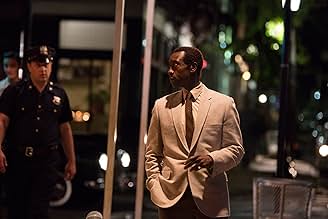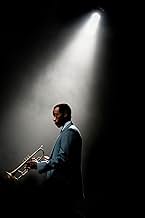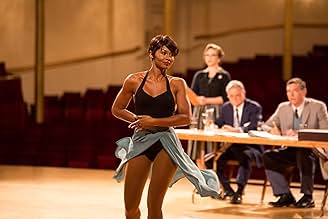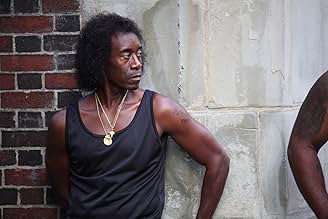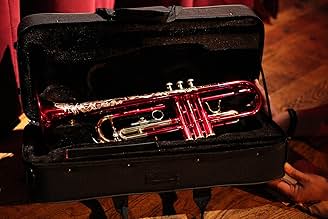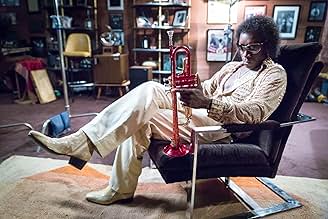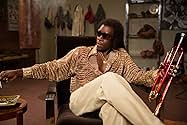An exploration of the life and music of Miles Davis.An exploration of the life and music of Miles Davis.An exploration of the life and music of Miles Davis.
- Awards
- 1 win & 14 nominations total
LaKeith Stanfield
- Junior
- (as Lakeith Lee Stanfield)
Featured reviews
Greetings again from the darkness. What would rate as the bigger challenge: defining jazz or describing the life of Miles Davis? In true "passion project" mode, Don Cheadle not only portrays the iconic trumpeter, but also directs, co-writes and co-produces. Cheadle's tribute to The Prince of Darkness is as open to interpretation as the hundreds of songs from Davis' recordings over thirty plus years.
Having stated in numerous interviews that he had no interest in the usual "cradle-to-grave" biopic, Cheadle's odd blend of fact, fiction and hallucination are meant to capture the essence of Miles Davis, rather than the life and times of the man. Guns, drugs, music, girls, and art are all present throughout this trippy trip of a movie that plays like an impressionistic painting, and not a portrait.
The bulk of the film is spent on Miles Davis during his self-imposed six year drug-fueled hiatus in the 1970's when he secluded himself in Howard Hughes fashion. There is an odd and ill-fitting plot involving the "secret" master tapes that Davis has recorded while waiting for his manager (Michael Stuhlbarg as Harper Hamilton) to pay him the money he is owed. Mixed in is a "Rolling Stone" writer named Dave Brill (Ewan McGregor) desperately trying to get an interview with Miles and listen to the tapes. This mad caper-ish core benefits greatly from the quick cuts to the past especially those featuring Frances Taylor (Emayatzy Corinealdi) as Miles' beautiful, talented and supportive wife.
Of course, we shouldn't expect linear story-telling from a man whose life was anything but linear. After all, we are focused on the man who claimed his music was not "jazz", but rather "Social Music" and that "it takes a long time to play like yourself". The car chases and gunfights might seem out of place, but do capture the essence of a man fueled by drugs and a possible (temporary) loss of his creative genius. Perhaps, as the movie suggests, Miles was remorseful for how he treated Frances. Or maybe it was simply the pressure of being Miles Davis . The coolest of Cool Jazz.
Mr. Cheadle does a nice job in portraying Davis, and is spot on in the trademark raspy whisper which Miles was known for (the after-effects of a larynx operation in the 1950's). Ms. Corinealdi (to appear in the new "Roots" project later this year) is outstanding as Frances Taylor, and is the one character we latch on to in hopes of maintaining our bearings throughout.
Taking its title from a 1957 Miles Davis album, the movie offers a glimpse into the mind of a musical genius who didn't always fit into "proper" society, and would be the perfect pairing for a head-scratching trumpeter double-bill with the recent "Born to be Blue", a look at Chet Baker.
Having stated in numerous interviews that he had no interest in the usual "cradle-to-grave" biopic, Cheadle's odd blend of fact, fiction and hallucination are meant to capture the essence of Miles Davis, rather than the life and times of the man. Guns, drugs, music, girls, and art are all present throughout this trippy trip of a movie that plays like an impressionistic painting, and not a portrait.
The bulk of the film is spent on Miles Davis during his self-imposed six year drug-fueled hiatus in the 1970's when he secluded himself in Howard Hughes fashion. There is an odd and ill-fitting plot involving the "secret" master tapes that Davis has recorded while waiting for his manager (Michael Stuhlbarg as Harper Hamilton) to pay him the money he is owed. Mixed in is a "Rolling Stone" writer named Dave Brill (Ewan McGregor) desperately trying to get an interview with Miles and listen to the tapes. This mad caper-ish core benefits greatly from the quick cuts to the past especially those featuring Frances Taylor (Emayatzy Corinealdi) as Miles' beautiful, talented and supportive wife.
Of course, we shouldn't expect linear story-telling from a man whose life was anything but linear. After all, we are focused on the man who claimed his music was not "jazz", but rather "Social Music" and that "it takes a long time to play like yourself". The car chases and gunfights might seem out of place, but do capture the essence of a man fueled by drugs and a possible (temporary) loss of his creative genius. Perhaps, as the movie suggests, Miles was remorseful for how he treated Frances. Or maybe it was simply the pressure of being Miles Davis . The coolest of Cool Jazz.
Mr. Cheadle does a nice job in portraying Davis, and is spot on in the trademark raspy whisper which Miles was known for (the after-effects of a larynx operation in the 1950's). Ms. Corinealdi (to appear in the new "Roots" project later this year) is outstanding as Frances Taylor, and is the one character we latch on to in hopes of maintaining our bearings throughout.
Taking its title from a 1957 Miles Davis album, the movie offers a glimpse into the mind of a musical genius who didn't always fit into "proper" society, and would be the perfect pairing for a head-scratching trumpeter double-bill with the recent "Born to be Blue", a look at Chet Baker.
Miles Ahead: the Film's Ending Saves Davis
Miles Ahead is an interesting take on the life of the jazz master. It's not a standard biopic telling a tale of the rise, then fall, then rebirth of an artist. Miles Ahead starts toward the end of his career when he is 'taking a break' from performing and recording. We learn that Davis has a deal with Colombia Records to start recording again, but he has yet to follow up when the film starts.
Several plot lines run throughout the film. However, the only one that is fully explored is his marriage. It runs the standard arc of plots with an introduction, conflict, plot points and resolution. The other stories within this film are not so successfully explored.
We have an idea why Davis took time off, but we don't get the full picture of his talents and his method for writing. More time spent on his work and less time with his interactions with the record label and the Rolling Stone magazine writer would have made this film more profound and enjoyable.
Don Cheadle is excellent at embodying the conflicts of the artist. It is not a salute to an idol, it is a full exposé, the talent, his influence, his trouble working with others, his addictions, and his struggle with fame. Davis at once hates his fame and desires to focus on the music while also uses it to get what he wants and to manipulate others. It's his love-hate relationship with his stardom that is the crux of the film in like of his past. However, the film doesn't go deep enough to satisfy your regular audience member that knows little about the man.
A major problem with the film is that while is does well in presenting the marriage and his conflicts with his fame, it also stupidly tries to be an action film. The relationship with the Rolling Stone writer just distracts from the heart of the story and plays out like a Three Stooges bit. Ewan McGregor is out of place as writer Dave Brill and can't bring enough charisma to the screen to make it work. The plot line with the writer is an annoying distraction from the acting of Cheadle and the struggles of an artist.
Thus, for all its good, and it has a lot of good, I only recommend two-thirds of the film. Fortunately, the ending is so well done that it salvages the good in the film.
Rating: Matinée
Cheadle is excellent at playing Davis, but his poor writing and directing decisions detract from what is an otherwise interesting film about a master musician.
Peace, Tex Shelters
Miles Ahead is an interesting take on the life of the jazz master. It's not a standard biopic telling a tale of the rise, then fall, then rebirth of an artist. Miles Ahead starts toward the end of his career when he is 'taking a break' from performing and recording. We learn that Davis has a deal with Colombia Records to start recording again, but he has yet to follow up when the film starts.
Several plot lines run throughout the film. However, the only one that is fully explored is his marriage. It runs the standard arc of plots with an introduction, conflict, plot points and resolution. The other stories within this film are not so successfully explored.
We have an idea why Davis took time off, but we don't get the full picture of his talents and his method for writing. More time spent on his work and less time with his interactions with the record label and the Rolling Stone magazine writer would have made this film more profound and enjoyable.
Don Cheadle is excellent at embodying the conflicts of the artist. It is not a salute to an idol, it is a full exposé, the talent, his influence, his trouble working with others, his addictions, and his struggle with fame. Davis at once hates his fame and desires to focus on the music while also uses it to get what he wants and to manipulate others. It's his love-hate relationship with his stardom that is the crux of the film in like of his past. However, the film doesn't go deep enough to satisfy your regular audience member that knows little about the man.
A major problem with the film is that while is does well in presenting the marriage and his conflicts with his fame, it also stupidly tries to be an action film. The relationship with the Rolling Stone writer just distracts from the heart of the story and plays out like a Three Stooges bit. Ewan McGregor is out of place as writer Dave Brill and can't bring enough charisma to the screen to make it work. The plot line with the writer is an annoying distraction from the acting of Cheadle and the struggles of an artist.
Thus, for all its good, and it has a lot of good, I only recommend two-thirds of the film. Fortunately, the ending is so well done that it salvages the good in the film.
Rating: Matinée
Cheadle is excellent at playing Davis, but his poor writing and directing decisions detract from what is an otherwise interesting film about a master musician.
Peace, Tex Shelters
Don Cheadle Directs Himself as Miles Davis, Nice Job on what If I remember correctly is his directorial debut. The film ping-pongs back and forth from the early 80's, right before Miles comes back from a 5 year or so hiatus to the 50's/60's era when he was married to dancer Frances Taylor.
The film has a madcap side to it with Ewan Mcgregor in a fun turn as a Rolling Stone reporter out to interview Miles and almost doubling as Miles' sidekick in a romp through the city (New York?) in the early 80's.
I don't want to give much away but I recommend the film, it is pretty amusing and jazz + biopic fans will find much to enjoy!
The film has a madcap side to it with Ewan Mcgregor in a fun turn as a Rolling Stone reporter out to interview Miles and almost doubling as Miles' sidekick in a romp through the city (New York?) in the early 80's.
I don't want to give much away but I recommend the film, it is pretty amusing and jazz + biopic fans will find much to enjoy!
The life and music of Miles Dewey Davis, better known as Miles Davis, is on display in the new bio-pic, Miles Ahead. Don Cheadle wears as many hats as afforded to him playing the title character as well as appearing in the credits as producer and director in a film that showcases Cheadle's talent and offers a strong case in ensuring the Oscar's have some color on the stage at next year's telecast.
The film opens in the later years of Miles' life. He has already reached fame and fortune. But his drug addiction has turned him into a Howard Hughes recluse. And he has temporarily turned his back on music. The story opens with Miles alone in his home when he is aggressively approached by Rolling Stone magazine writer Dave Brill (Ewan McGreggor) who is interested in writing about Miles' new project. The opportunistic Brill gets swept into a fantastical series of events that include following Miles as he confronts his record label, procures cocaine and is chased through the streets in a hail of gunfire by unscrupulous folk looking to advance their worldly standing through the theft of Miles' still-in-progress demo tape.
The events that unfold are not based on historical fact. But it doesn't matter. Miles Ahead is more a movie about the attitude and persona of legend Miles Davis than it is a straight up account of a fraction of the musician's life.
By way of flashbacks, we get a glimpse into the more serene life of Miles Davis before drugs off-tracked his career. A clean cut Davis is seen rising in ranks through the Jazz clubs of America and eventually falling for Frances Taylor (Emayatzy Corinealdi) who would eventually become his wife of 10-years.
The film doesn't dive too deeply into the domestic violence between the two lovers that became headlines back in the early 60's nor does it touch too intensively the racial tensions in America at the time. There is a scene where Davis is unprovokingly harassed by police officers and taken to jail for simply showing kindness to a woman of white skin, but the film has no message to present in terms of Miles' involvement with racial divides at the time. Instead, Cheadle keeps the camera focused on a single day in the broken down icon's history. This works largely to the films advantage but sacrifices giving us a glimpse into the life of the historic character.
Don Cheadle is a revelation as Miles. The raspy voice, the trumpet playing, the belligerence. All are played exactly on key. The supporting cast does amply in tow but there is little to look at outside of Cheadle's performance.
For this particularly story, things do work out well in the end. Relatively. We had hoped for end credit title cards that would have told us more about the man. Those unfamiliar with Miles Davis might have wanted to know if he was still alive or what became of Frances Taylor after their split. Even a short blurb unveiling Miles' nine Grammy Awards would have been refreshingly educational at film's end.
Miles Ahead is not the be-all of musician movies. But I would categorize Cheadle's performance of the late trumpet player as one of the better performances of a real-life musician on screen. It's good enough to recommend the film to anyone. Jazz fan or not.
The film opens in the later years of Miles' life. He has already reached fame and fortune. But his drug addiction has turned him into a Howard Hughes recluse. And he has temporarily turned his back on music. The story opens with Miles alone in his home when he is aggressively approached by Rolling Stone magazine writer Dave Brill (Ewan McGreggor) who is interested in writing about Miles' new project. The opportunistic Brill gets swept into a fantastical series of events that include following Miles as he confronts his record label, procures cocaine and is chased through the streets in a hail of gunfire by unscrupulous folk looking to advance their worldly standing through the theft of Miles' still-in-progress demo tape.
The events that unfold are not based on historical fact. But it doesn't matter. Miles Ahead is more a movie about the attitude and persona of legend Miles Davis than it is a straight up account of a fraction of the musician's life.
By way of flashbacks, we get a glimpse into the more serene life of Miles Davis before drugs off-tracked his career. A clean cut Davis is seen rising in ranks through the Jazz clubs of America and eventually falling for Frances Taylor (Emayatzy Corinealdi) who would eventually become his wife of 10-years.
The film doesn't dive too deeply into the domestic violence between the two lovers that became headlines back in the early 60's nor does it touch too intensively the racial tensions in America at the time. There is a scene where Davis is unprovokingly harassed by police officers and taken to jail for simply showing kindness to a woman of white skin, but the film has no message to present in terms of Miles' involvement with racial divides at the time. Instead, Cheadle keeps the camera focused on a single day in the broken down icon's history. This works largely to the films advantage but sacrifices giving us a glimpse into the life of the historic character.
Don Cheadle is a revelation as Miles. The raspy voice, the trumpet playing, the belligerence. All are played exactly on key. The supporting cast does amply in tow but there is little to look at outside of Cheadle's performance.
For this particularly story, things do work out well in the end. Relatively. We had hoped for end credit title cards that would have told us more about the man. Those unfamiliar with Miles Davis might have wanted to know if he was still alive or what became of Frances Taylor after their split. Even a short blurb unveiling Miles' nine Grammy Awards would have been refreshingly educational at film's end.
Miles Ahead is not the be-all of musician movies. But I would categorize Cheadle's performance of the late trumpet player as one of the better performances of a real-life musician on screen. It's good enough to recommend the film to anyone. Jazz fan or not.
Absolutely stunning! Attended the world premiere at the NewYork film festival this past weekend. As the film ended, my mind felt entranced. The film's rapid clip style and dramatic ending made me film as if I had viewed one of Mile's mind blowing paintings. Somehow, it all seemed to come together as one mental image at the end. An ingenious portrayal of both Miles music and painting style. Along with the fabulous music throughout, the movie even included a clip of miles working on one of his paintings, as if the cue us in on the films approach.
The music of Miles Davis provides the background for many of the scenes and it is performed in many scenes. As Miles was also an accomplished abstract painter, he is also featured creating some of his artwork. His challenges, triumphs and failures in love, the music industry, music composition, health, etc. compose a collage that comes together like one of his abstract paintings. At the end, a stunning scene brings it all together and emphasizes the phenomenal impact of the Miles music through today, for all time, and across many genres.
The music of Miles Davis provides the background for many of the scenes and it is performed in many scenes. As Miles was also an accomplished abstract painter, he is also featured creating some of his artwork. His challenges, triumphs and failures in love, the music industry, music composition, health, etc. compose a collage that comes together like one of his abstract paintings. At the end, a stunning scene brings it all together and emphasizes the phenomenal impact of the Miles music through today, for all time, and across many genres.
Did you know
- TriviaMiles Davis really called up Phil Schaap on the air and told him he talked too much.
- GoofsVarious scenes show Miles playing trumpets apparently made by Vincent Bach Corp., Adams, and others. But he never appears to play a Martin Committee trumpet. Miles played various customized Martin Committee trumpets almost exclusively throughout his career.
- Quotes
Doorman: Do you have a pass?
Miles Davis: [points to his face] You're Looking At It.
- SoundtracksGone 2015
Produced by Don Cheadle and Robert Glasper
Written by Robert Glasper, Pharoahe Monch and Keyon Harrold
Published by Troy Jamerson Trescadecaphobia Music (BMI), I Am A Jazzy Guy (SESAC)/EMI FORAY MUSIC and Keykat Publishing Co (ASCAP)/Royalty Network
Performed by
Pharoahe Monch - Vocals
Keyon Harrold - Trumpet
Robert Glasper - Keys
Burniss Earl Travis - Bass
Justin Tyson - Drums
Mike Marino - Guitar
- How long is Miles Ahead?Powered by Alexa
Details
- Release date
- Country of origin
- Official sites
- Language
- Also known as
- Miles Davis
- Filming locations
- Cincinnati, Ohio, USA(Entire Movie)
- Production companies
- See more company credits at IMDbPro
Box office
- Gross US & Canada
- $2,610,896
- Opening weekend US & Canada
- $114,530
- Apr 3, 2016
- Gross worldwide
- $3,473,958
- Runtime
- 1h 40m(100 min)
- Color
- Aspect ratio
- 2.35 : 1
Contribute to this page
Suggest an edit or add missing content







